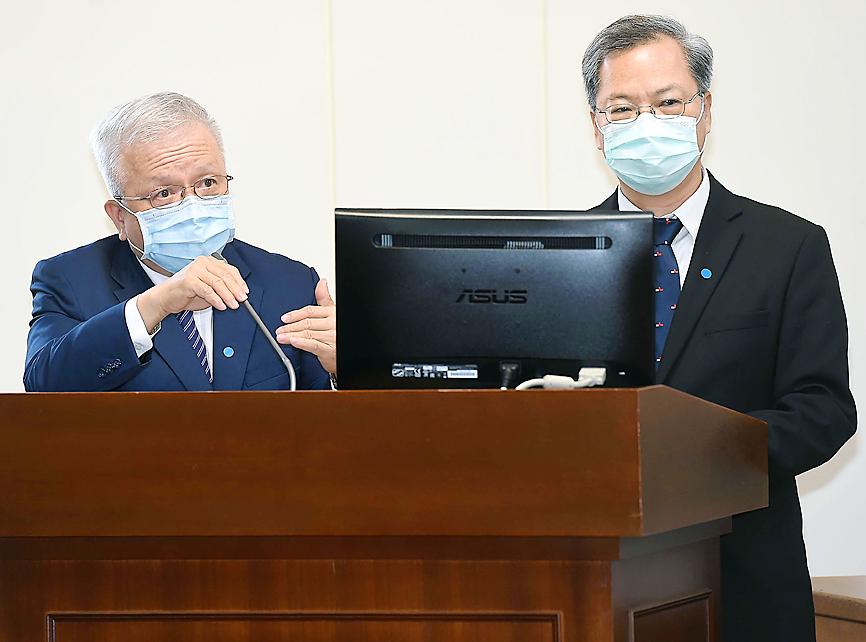A sharp increase in oil prices caused by the war between Russia and Ukraine is adding pressure to inflation in Taiwan and could dent GDP growth, top-ranking officials said yesterday.
Inflation would rise 0.5 to 0.7 percentage points higher this year if international crude oil prices climb to US$110 a barrel, from US$85 in February, central bank Deputy Governor Yen Tzung-ta (嚴宗大) said, adding that the trend would also weigh on GDP growth by 0.3 to 0.4 percentage points.
Yen was answering questions from lawmakers at a meeting of the legislature’s Economics Committee.

Photo: Chu Pei-hsiung, Taipei Times
The central bank would review its monetary policy at its quarterly meeting on Thursday, but whether rate hikes are necessary would be up to the board to decide, said Yen, who is also a board member.
Lawmakers were anxious to know whether Russia’s invasion of Ukraine would hurt Taiwan’s export-oriented economy in light of its heavy dependence on imported crude oil and natural gas.
“Inflationary pressures pose bigger threats than trade or financial exposures, which are controllable as Taiwan’s trade with Russia amounts to US$4.94 billion a year, accounting for a tiny 0.72 percent share — mainly imports of mineral and metal products,” Yen said.
Taiwan would find other suppliers if global economic sanctions cause disruptions in the supply of nickel, neon gas and other raw materials used in the manufacturing of semiconductors, electric vehicles and stainless steel, he said.
Taiwan’s financial institutions have limited exposure to Russia and Ukraine at less than 1 percent of their assets, Yen said.
However, escalating sanctions could dampen consumer confidence and interest in investment, and hurt the global economy as a whole, a scenario that is unfavorable for Taiwan, he said.
National Development Council Minister Kung Ming-hsin (龔明鑫) shared similar observations.
A sharp rise in oil prices driven by the war could push annual inflation up to 2.5 percent at most, he said.
The calculation was based on a “worst-case scenario” in which oil prices rise 30 percent by the end of the year, Kung said, citing statistics by the Directorate-General of Budget, Accounting and Statistics (DGBAS).
A 10 percent hike in oil prices would cause the consumer price index (CPI) to increase 0.2 percentage points, and a 30 percent rise in oil prices would cause the inflationary gauge to gain 0.6 percentage points, lifting annual CPI to about 2.5 percent, the DGBAS said.
The DBGAS last month forecast that Taiwan’s GDP would grow 4.42 percent this year, while the CPI would rise 1.93 percent.
Considering recent developments abroad, it now appears “very possible” that the CPI would exceed 2 percent this year, Kung said, adding that a 2.5 percent increase is “mild” by international standards.
The government would monitor the situation closely, Kung added.
Last year, 9.74 percent of Taiwan’s natural gas imports and 14.58 percent of its coal imports were purchased from Russia, the Bureau of Energy has said.
Additional reporting by CNA

MULTIFACETED: A task force has analyzed possible scenarios and created responses to assist domestic industries in dealing with US tariffs, the economics minister said The Executive Yuan is tomorrow to announce countermeasures to US President Donald Trump’s planned reciprocal tariffs, although the details of the plan would not be made public until Monday next week, Minister of Economic Affairs J.W. Kuo (郭智輝) said yesterday. The Cabinet established an economic and trade task force in November last year to deal with US trade and tariff related issues, Kuo told reporters outside the legislature in Taipei. The task force has been analyzing and evaluating all kinds of scenarios to identify suitable responses and determine how best to assist domestic industries in managing the effects of Trump’s tariffs, he

TIGHT-LIPPED: UMC said it had no merger plans at the moment, after Nikkei Asia reported that the firm and GlobalFoundries were considering restarting merger talks United Microelectronics Corp (UMC, 聯電), the world’s No. 4 contract chipmaker, yesterday launched a new US$5 billion 12-inch chip factory in Singapore as part of its latest effort to diversify its manufacturing footprint amid growing geopolitical risks. The new factory, adjacent to UMC’s existing Singapore fab in the Pasir Res Wafer Fab Park, is scheduled to enter volume production next year, utilizing mature 22-nanometer and 28-nanometer process technologies, UMC said in a statement. The company plans to invest US$5 billion during the first phase of the new fab, which would have an installed capacity of 30,000 12-inch wafers per month, it said. The

Taiwan’s official purchasing managers’ index (PMI) last month rose 0.2 percentage points to 54.2, in a second consecutive month of expansion, thanks to front-loading demand intended to avoid potential US tariff hikes, the Chung-Hua Institution for Economic Research (CIER, 中華經濟研究院) said yesterday. While short-term demand appeared robust, uncertainties rose due to US President Donald Trump’s unpredictable trade policy, CIER president Lien Hsien-ming (連賢明) told a news conference in Taipei. Taiwan’s economy this year would be characterized by high-level fluctuations and the volatility would be wilder than most expect, Lien said Demand for electronics, particularly semiconductors, continues to benefit from US technology giants’ effort

‘SWASTICAR’: Tesla CEO Elon Musk’s close association with Donald Trump has prompted opponents to brand him a ‘Nazi’ and resulted in a dramatic drop in sales Demonstrators descended on Tesla Inc dealerships across the US, and in Europe and Canada on Saturday to protest company chief Elon Musk, who has amassed extraordinary power as a top adviser to US President Donald Trump. Waving signs with messages such as “Musk is stealing our money” and “Reclaim our country,” the protests largely took place peacefully following fiery episodes of vandalism on Tesla vehicles, dealerships and other facilities in recent weeks that US officials have denounced as terrorism. Hundreds rallied on Saturday outside the Tesla dealership in Manhattan. Some blasted Musk, the world’s richest man, while others demanded the shuttering of his